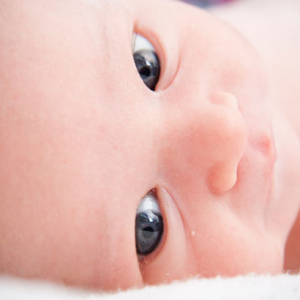
Retinopathy of prematurity (ROP) affects approximately 60-70% of infants born at less than 32 weeks’ gestational age or less than 1501g birth weight. In most of these infants the eye condition is only mild, just requires monitoring and resolves without any intervention.
ROP occurs when a baby is born too early to have reached an important milestone in the development of their eyes. To function properly, the retina, located at the back of the eye, needs a constant supply of blood to provide oxygen. The blood vessels that supply this blood usually develop between weeks 16 and 36 of pregnancy. The retina plays an important function in detecting light which enables us to see.
From 16 weeks’ gestation the blood vessels grow gradually toward the edges of the retina, supplying oxygen and nutrients. During the last 12 weeks of a pregnancy, the eye develops rapidly. When a baby is born full-term, the retinal blood vessel growth is mostly complete (the retina usually finishes growing a few weeks to a month after birth). But if a baby is born prematurely, before these blood vessels have reached the edges of the retina, normal vessel growth may stop and the edges of the retina may not get enough oxygen and nutrients therefore developing ROP.
Neonatal Unit at Oxford Road Campus
On the Newborn Intensive Care Unit at Oxford Road Campus, there is a designated ROP team who run weekly clinics to assist screening and treatment for ROP. Depending on the severity of the ROP your baby will be screened either weekly or fortnightly. If your baby qualifies for ROP screening the week before your baby’s screen is due. You will receive an information booklet about the condition and the different severities of ROP and have the opportunity to discuss the condition with the team.
The ROP nursing team are all trained to perform retinal photography on the infants who require screening for this condition. Parental involvement is encouraged and if parents prefer to be present during the review this can be arranged. The management is overseen by an expert consultant ophthalmologist (eye doctor).
The Neonatal Unit at Saint Mary’s Hospital Oxford Road Campus is one of only a few units in the country who provide this form of screening. This method enables the screening programme to be tailor made to the needs of the individual infant and family due to the consistent presence of the nursing team. Thus ensuring up to date technology is used and safe quality care is provided to the babies receiving our care.
The ROP nurse will be happy to discuss any questions you have once you have been given this booklet.
Neonatal Unit at Wythenshawe and Neonatal Unit at North Manchester
At North Manchester and Wythenshawe the ophthalmologist visits the unit once a week to screen babies. To ensure all our infants receive an equitable service there are plans in place to roll out the nurse retinal photography model in the near future. If your baby requires treatment for ROP they will need to be transferred to our NICU at Saint Mary’s Hospital. This will be discussed with you in greater detail at the time. Once treatment is complete your baby will return to the local Neonatal Unit as soon as possible.
 In this section
In this section